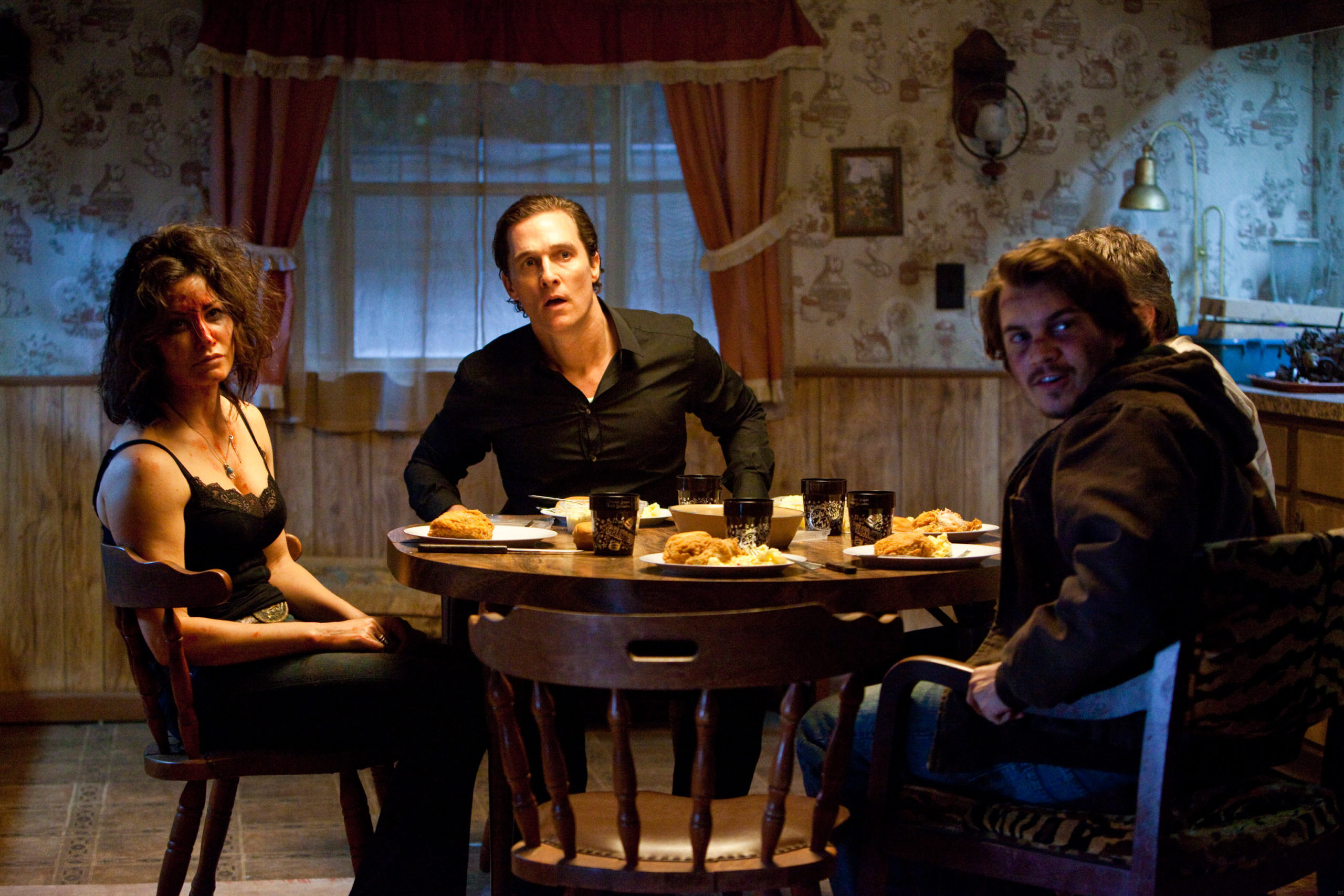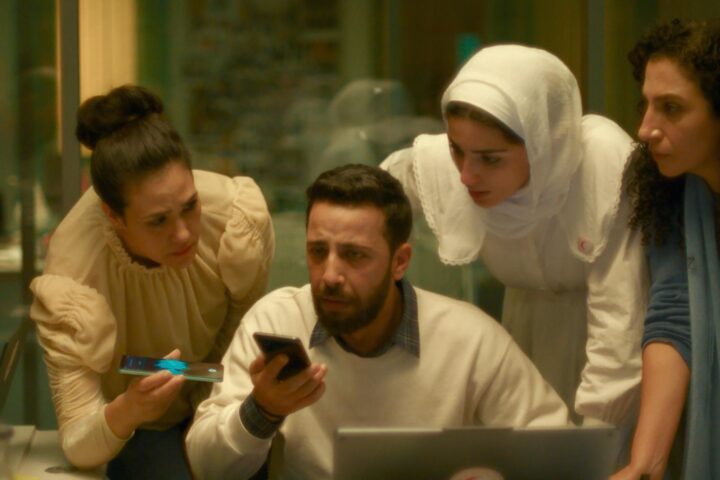William Friedkin’s film of Tracy Letts’ corrosive play Killer Joe, about a white trash Texas clan that hatches a plan to murder their matriarch for—what else?—a paltry insurance policy, is a movie with good acting, much violence, nary any social context and scant redemption to make the mayhem meaningful or compelling. It plays like a southern fried buffet of in-your-face nastiness, set in what surely must (we pray) be some cruel dystopia where people are born stupid or evil, and usually both, a disastrous cocktail. And while all of this may make the screen version of Killer Joe an at-times difficult sit, as an actors’ exercise it is compulsively watchable, mainly for Matthew McConaughey in the title role of a hard-assed sheriff moonlighting as a contract killer, and Gina Gershon as a duplicitous bimbo fatale whose number is almost up.
Adapted by Letts (Bug, August: Osage County) from his first play, written more than two decade ago and with a controversial stage legacy here in Chicago, Killer Joe introduces us to hapless Chris Smith (Emile Hirsch), in deep with some small-time drug dealers for a hefty sum. After banging on the door of a worn-down trailer only to be greeted by his bottomless (yes, bottomless) stepmother, Sharla (Gina Gershon), he and dim-witted dad Ansel (Thomas Haden Church) head to the local strip joint to negotiate killing dad’s ex-wife and Chris’ mother, cashing in her 50k insurance policy and splitting up the cash. Problem solved, right? Not quite, and right here the picture throws us by taking this darkest of scenarios and playing it without a shred of conscience—not once does anyone contemplate the savageness of such a proposal. Moreover, it’s played for laughs at the expense of the mentally challenged father, the dimmest of dim bulbs.
The pair conspires to hire Killer Joe Cooper (McConaughey), the local sheriff with a down-low reputation as an extracurricular hit man. It goes without saying that he’s leagues smarter than his amateur clients, one of whom he takes quite a shine to—virginal, baby-doll sister Dottie (Juno Temple), whom Chris protects but also whom Joe sees as collateral. In Dottie’s mind, Joe is a fractured prince charming of sorts, and perhaps just the right guy to deliver her from the blues of her family’s dysfunction, to put it mildly.
Of course, it goes without saying that the family plot goes dreadfully awry, the money falls through, prices must be paid and the deflowering of a naïve young girl are the order of the day, and what registers so strongly is Letts’ determination to nail these yokels to the wall (or the floor, as it were). It would be difficult to find a picture where we are as encouraged to laugh at such a lack of social mores and brain cells as Killer Joe, and therein lies the chief problem with this adaptation—condescension rules and empathy is nil.
There’s also a mean-spiritedness oozing through the film’s DNA which rightfully earned an NC-17 rating, notably for the climactic scene involving a sadistic comeuppance meted out to Sharla, played with absolute commitment and heels-dug-in grit by the marvelous Gershon, opening emotional floodgates she’s heretofore kept from us over the last two decades of her widely varied career, a mix of notable turns ranging from vamp (Bound) to camp (Showgirls), tony (The Insider) to indie (Demonlover), daring (Prey for Rock and Roll) to direct-to-video. But Killer Joe is the actresses’ finest hour, a performance that deserves serious Oscar consideration.
Under what can politely be called interrogation by Joe, Gershon’s Sharla is at once confident, bewildered, subjugated and then broken, crawling about the floor, awash in a river of blood while forced to perform a hideous, mock-fellatio on a fried chicken drumstick (you heard that correctly)—all while husband Ansel turns a blind eye in obvious approval, unwilling to intervene. Talk about compassion. But Killer Joe is that kind of movie, and this killer moment is the only one in the picture to suggest, courtesy of a great performance, the human cost of the depravities that seem to come, to this family, as second nature. Or perhaps first.
With The Lincoln Lawyer, Magic Mike and now Killer Joe, McConaughey is having a career resurgence and erasing the not-so-Tracy-and-Hepburn era he shared with Kate Hudson in a slew of low-rent chick flicks, while reminding us how compelling he was in dramas, notably A Time to Kill, Amistad and Thirteen Conversations About One Thing, where he was played a slickster yuppie who fled a hit and run only to be haunted by his cowardice.
As Joe, McConaughey gets the killer part right as well, but in a vanity free performance (like Magic Mike’s cock-of-the-walk strip club proprietor) he appears semi-nude in some potentially outrageous set-ups, seducing a very, very young girl who doesn’t know better, walking an acting tightrope between inspiration and making himself look foolish (which doesn’t happen). It’s risky, liberating work.
Letts, the genius playwright who gave us a magnum opus (and won the Pulitzer) in August: Osage County, the Tony-winning saga of another power struggle in a fierce, Southern family, which afforded Chicago actress Amy Morton a second-to-none role as the traumatized daughter of an ailing matriarch (a film adaptation of which is set to start shooting with Meryl Streep and Julia Roberts), clearly intends for us to feel some degree of kinship with the foibles and failings of Killer Joe’s tragically flawed family. But those intentions are largely absent in the execution.
As directed by Friedkin—superbly serving his actors and conveying a vice-like grip on the plot’s twisty machinations—Killer Joe, for its merits, doesn’t give us one character we can access as a guide through this very dark place, expertly shot as it is by the great Caleb Deschanel as a cold, burnt-out middle of nowhere, a hermetically sealed no man’s land where evil festers, and then later, a claustrophobic torture chamber (it feels slightly stagy in its big final windup, and it should).
It’s hard to watch Killer Joe without fondly recalling the Coen brothers’ 1984 classic Blood Simple, about an adulterous Texan couple, the cuckolded husband and his yellow-suited hit man, memorably played by M. Emmett Walsh as marble-mouthed fat cat who sets off a chain of delirious betrayals. That picture was stylish and atmospheric, oddly amusing and drenched in the baking Lone Star sun, equal parts ten-gallon hats and gallons of blood. To trust or not to trust, that film asked. In Killer Joe, there’s never any question. Despite drawing on the local color Letts soaked up during a stint living in longhorn territory—authenticity isn’t the issue here—Killer Joe is the skirt steak to Blood Simple‘s filet. It has the scheming backstabbers, adulterers, hit men and reversals all down.
But it just doesn’t have a heart.
2 stars.



